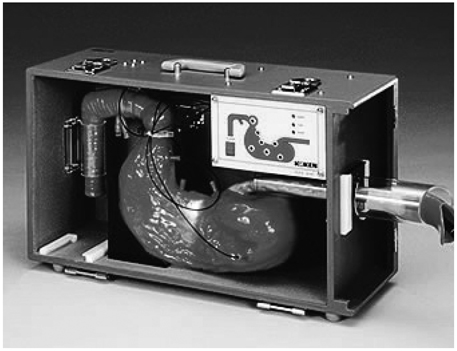Yonsei Med J.
2012 Mar;53(2):304-309. 10.3349/ymj.2012.53.2.304.
The Box Simulator Is Useful for Training Novice Endoscopists in Basic Endoscopic Techniques
- Affiliations
-
- 1Department of Internal Medicine, Gangdong Kyung Hee University Hospital, Kyung Hee University College of Medicine, Seoul, Korea. dramc@hanmail.net
- KMID: 1120196
- DOI: http://doi.org/10.3349/ymj.2012.53.2.304
Abstract
- PURPOSE
The present study was aimed at evaluating the usefulness of box simulators for training novice endoscopists.
MATERIALS AND METHODS
An explanation of the goals, contents, and features of the simulator was given to study participants. The participants then received "hands-on training" in gastrointestinal endoscopy techniques using a box simulator. Subsequently, they were asked to answer 19 structured questions about the simulator. Ratings were scored on a scale from 1 to 5 for questions concerning their first impression of the simulator. Questions on the usefulness of the simulator and the training course were answered as "agree", "disagree", or "no opinion".
RESULTS
A total of 32 participants filled out the questionnaire. The mean scores on the simulator's usefulness, features, and realistic movements before the training were between 1.5 and 2.0. There were no significant differences between the mean values of the scores given by novice users compared to non-novice users. However, after receiving training on the simulator, 90.6% of the participants considered the box simulator a generally useful tool for learning basic endoscopic techniques, and 90.6% agreed that the simulator was useful for improving hand-eye coordination.
CONCLUSION
Box simulators may be useful for training novice endoscopists in basic gastrointestinal endoscopic techniques.
MeSH Terms
Figure
Cited by 1 articles
-
Current Endoscopy Training in Korea and Future Aspects
Young-Eun Joo
Korean J Gastroenterol. 2022;80(5):207-210. doi: 10.4166/kjg.2022.122.
Reference
-
1. Bond JH, Frakes JT. Who should perform colonoscopy? How much training is needed? Gastrointest Endosc. 1999. 49:657–659.
Article2. Cass OW. Objective evaluation of competence: technical skills in gastrointestinal endoscopy. Endoscopy. 1995. 27:86–89.
Article3. Wexner SD, Litwin D, Cohen J, Earle D, Ferzli G, Flaherty J, et al. Principles of privileging and credentialing for endoscopy and colonoscopy. Gastrointest Endosc. 2002. 55:145–148.
Article4. Williams CB, Thomas-Gibson S. Rational colonoscopy, realistic simulation, and accelerated teaching. Gastrointest Endosc Clin N Am. 2006. 16:457–470.
Article5. Koch AD, Haringsma J, Schoon EJ, de Man RA, Kuipers EJ. A second-generation virtual reality simulator for colonoscopy: validation and initial experience. Endoscopy. 2008. 40:735–738.
Article6. Verdaasdonk EG, Stassen LP, Monteny LJ, Dankelman J. Validation of a new basic virtual reality simulator for training of basic endoscopic skills: the SIMENDO. Surg Endosc. 2006. 20:511–518.
Article7. Gallagher AG, Ritter EM, Satava RM. Fundamental principles of validation, and reliability: rigorous science for the assessment of surgical education and training. Surg Endosc. 2003. 17:1525–1529.
Article8. Haycock A, Koch AD, Familiari P, van Delf F, Dekker E, Petruzziello L, et al. Training and transfer of colonoscopy skills: a multinational, randomized, blinded, controlled trial of simulator versus bedside training. Gastrointest Endosc. 2010. 71:298–307.
Article9. Haycock AV, Bassett P, Bladen J, Thomas-Gibson S. Validation of the second-generation Olympus colonoscopy simulator for skills assessment. Endoscopy. 2009. 41:952–958.
Article10. Schijven M, Jakimowicz J. Face-, expert, and referent validity of the Xitact LS500 laparoscopy simulator. Surg Endosc. 2002. 16:1764–1770.
Article11. Ali MR, Mowery Y, Kaplan B, DeMaria EJ. Training the novice in laparoscopy. More challenge is better. Surg Endosc. 2002. 16:1732–1736.12. Gallagher AG, Ritter EM, Champion H, Higgins G, Fried MP, Moses G, et al. Virtual reality simulation for the operating room: proficiency-based training as a paradigm shift in surgical skills training. Ann Surg. 2005. 241:364–372.13. Park J, MacRae H, Musselman LJ, Rossos P, Hamstra SJ, Wolman S, et al. Randomized controlled trial of virtual reality simulator training: transfer to live patients. Am J Surg. 2007. 194:205–211.
Article14. Cass OW, Freeman ML, Peine CJ, Zera RT, Onstad GR. Objective evaluation of endoscopy skills during training. Ann Intern Med. 1993. 118:40–44.
Article
- Full Text Links
- Actions
-
Cited
- CITED
-
- Close
- Share
- Similar articles
-
- The Efficacy of a Newly Designed, Easy-to-Manufacture Training Simulator for Endoscopic Biopsy of the Stomach
- Usefulness of a new polyvinyl alcohol hydrogel (PVA-H)-based simulator for endoscopic submucosal dissection training: a pilot study
- Validation of a Novel Endoscopic Retrograde Cholangiopancreatography Cannulation Simulator
- Efficacy of a Three-Dimensional-Printed Training Simulator for Endoscopic Biopsy in the Stomach
- A Newly Designed 3-Dimensional Printer-Based Gastric Hemostasis Simulator with Two Modules for Endoscopic Trainees (with Video)


